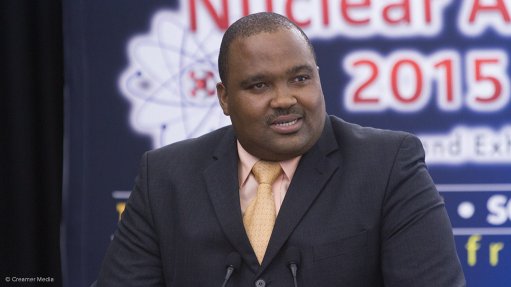
Dr Bismark Tyobeka
Photo by: Duane Daws/Creamer Media
South Africa’s National Nuclear Regulator (NNR) CEO Dr Bismark Tyobeka has been appointed chairperson of the Regulatory Cooperation Forum (RCF) of the International Atomic Energy Agency (IAEA), the NNR announced on Friday. The appointment was decided at the annual RCF Steering Committee meeting in Brussels, Belgium, which took place from June 13 to June 15. Tyobeka had previously (from 2014) been vice chairperson of the RCF.
In its press release, the NNR noted that his previous position as vice chairperson was one of the reasons Tyobeka was appointed chairperson. This ensured continuity in the work of the RCF.
“Delivering on our long standing commitment towards achieving and sustaining a high level of nuclear safety to support socio-economic progress will always be our key focus,” affirmed Tyobeka. “To chair the RCF is truly a reflection of the international nuclear community’s confidence in South Africa’s commitment to enhancing the development of nuclear safety regulatory infrastructure of regulators from new and existing nuclear countries.”
The RCF was actually established in South Africa, at the second IAEA Conference on Effective Regulatory Systems in Cape Town in December 2009. It is composed of nuclear regulators and encourages the exchange of regulatory experience and knowledge, by means of international collaboration and cooperation. Its basis is provided by the IAEA’s safety standards. Its membership includes countries with long-established and large nuclear power programmes, countries with smaller such programmes which are considering expanding their nuclear energy capacities, and countries starting nuclear power programmes.
The NNR was created by the National Nuclear Regulator Act of 1999. Its central mission is to protect people, property and the environment from nuclear damage, by creating and maintaining regulatory practices and safety standards, optimised for South Africa and in line with international principles and best practices.
“South Africa, like the rest of the world, is facing economic, social and environmental challenges,” pointed out Tyobeka. “These challenges are further compounded by the increasing demand for clean, safe and reliable energy. Such demand is taking place amidst heightened socio-political tensions but we will all have to remain focused on the roles we have to play in creating a better future for the world.”